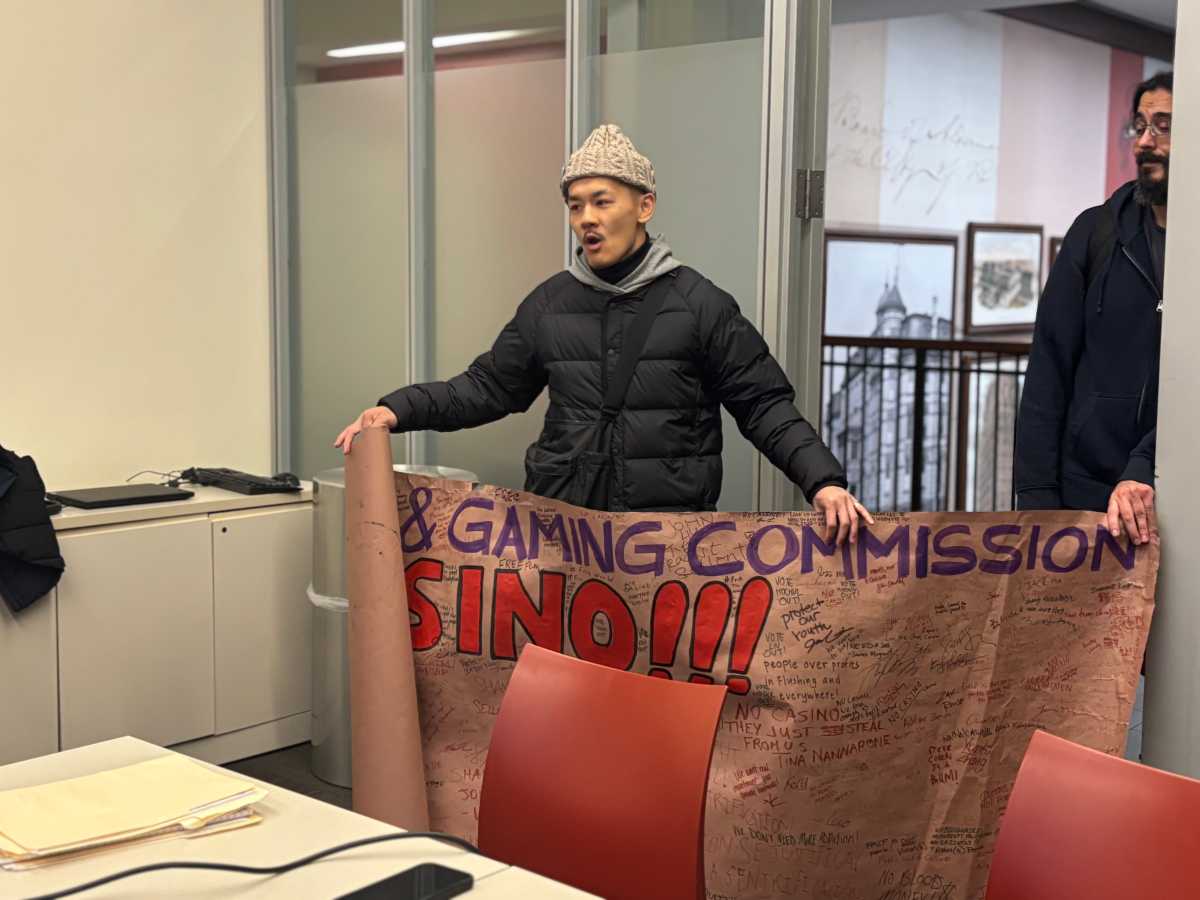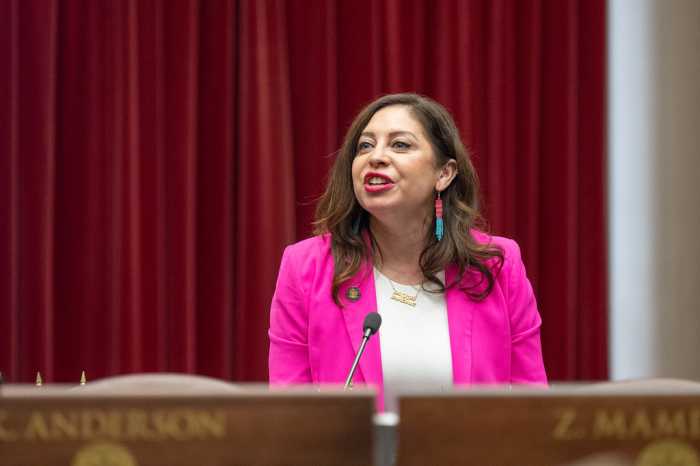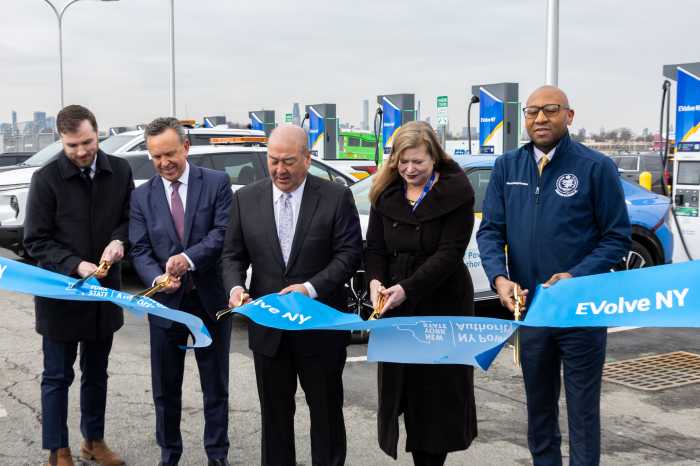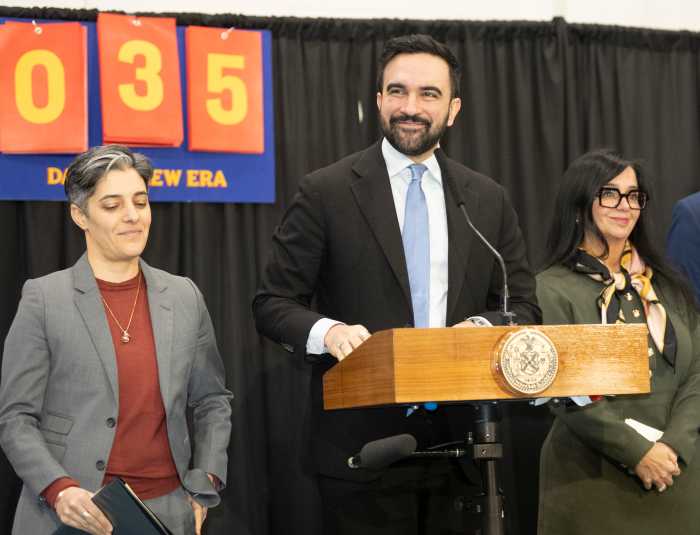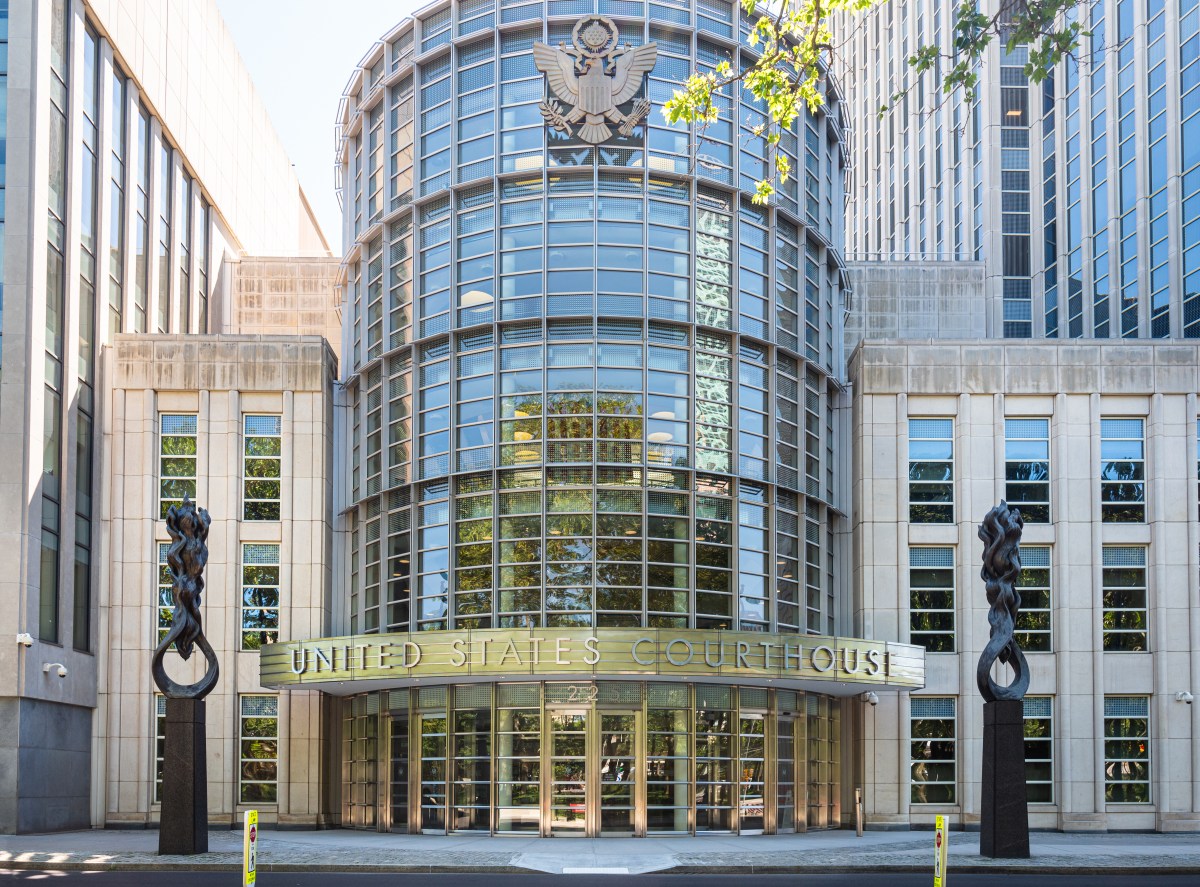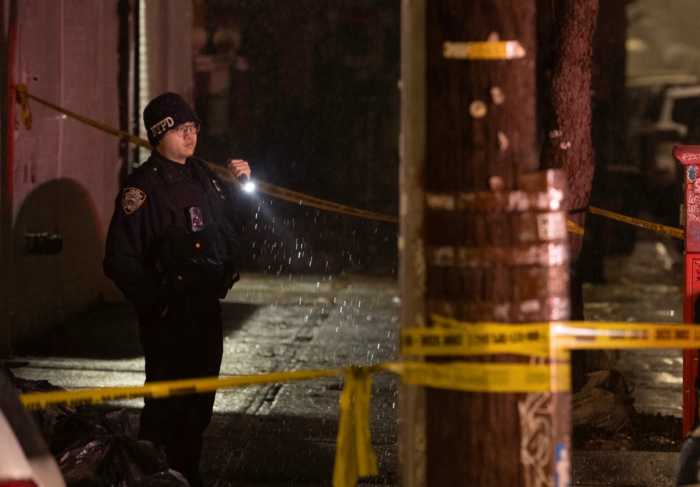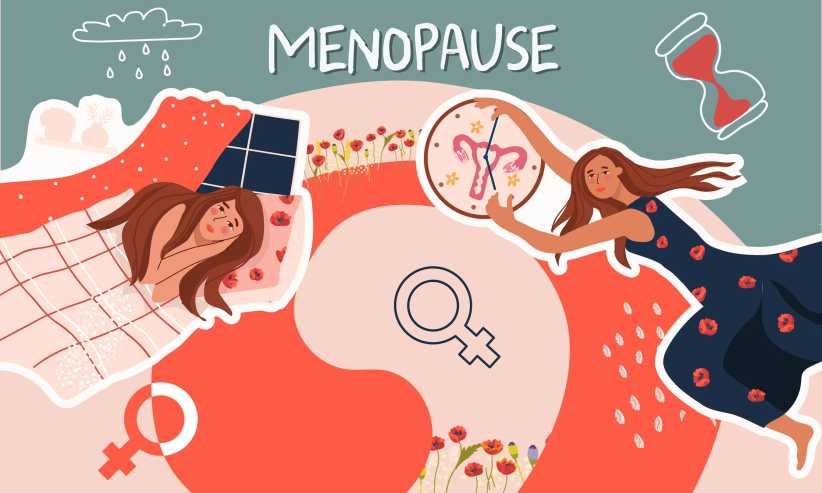Anti-casino picketers confronted the state Gaming Facility Location Board during its meeting at St. John’s University on Nov. 17 after the board conducted site visits for three separate proposals, including the Metropolitan Park casino in Flushing, earlier that day.
The commission allowed anti-casino organizer Jack Hu to speak for a few minutes, as well as unroll a banner signed by approximately 800 anti-casino protesters. “We hope that you do the right thing,” Hu said to the board. “We’re calling on you to please reject this project.”
A board member, who gave Hu a few minutes to speak, then asked picketers to leave the meeting room, located on the third floor of the college’s D’Angelo Center.
The same board member re-emerged from the room shortly after and announced to picketers that, after opening the meeting, the board would immediately go into executive session, which is not open to the public. He said there would be no public comment, and the board would simply be deliberating on the casino applications.
After a few more minutes, the board left the room and did not take any questions from picketers.
“We came today to try to speak with the board, and we did have our time with the board today,” Hu said immediately after walking out. “They were generous enough to give us a few minutes and speak.”
Mahtab Khan, a community organizer and activist who attended the Monday night picket, said he worries what the casino could mean for affordability in the neighborhood, as well as white collar crime. He felt the board’s decision not to take public comment was “dishonest” and suggested a lack of transparency.
“I guess they’re concerned with us disrupting whatever they’re trying to do here,” Khan said. “I mean, the decisions that were made — electeds voted on it, right? They have a bigger say in it. But us as a collective, as a community, we’re not able to vote on it. If anything, it should have been on the ballot.”
“It seems no different from what our community has faced all along,” added Sarah Ahn, an organizer at the Flushing Workers Center. “It’s just another phase of this very sort of backroom deal being struck, and they go through the motions of some public process.”
In an email to QNS on Nov. 18, the gaming commission stated it would not comment on any applicants who submitted proposals for any of the sites, nor did it address economic concerns raised by picketers.
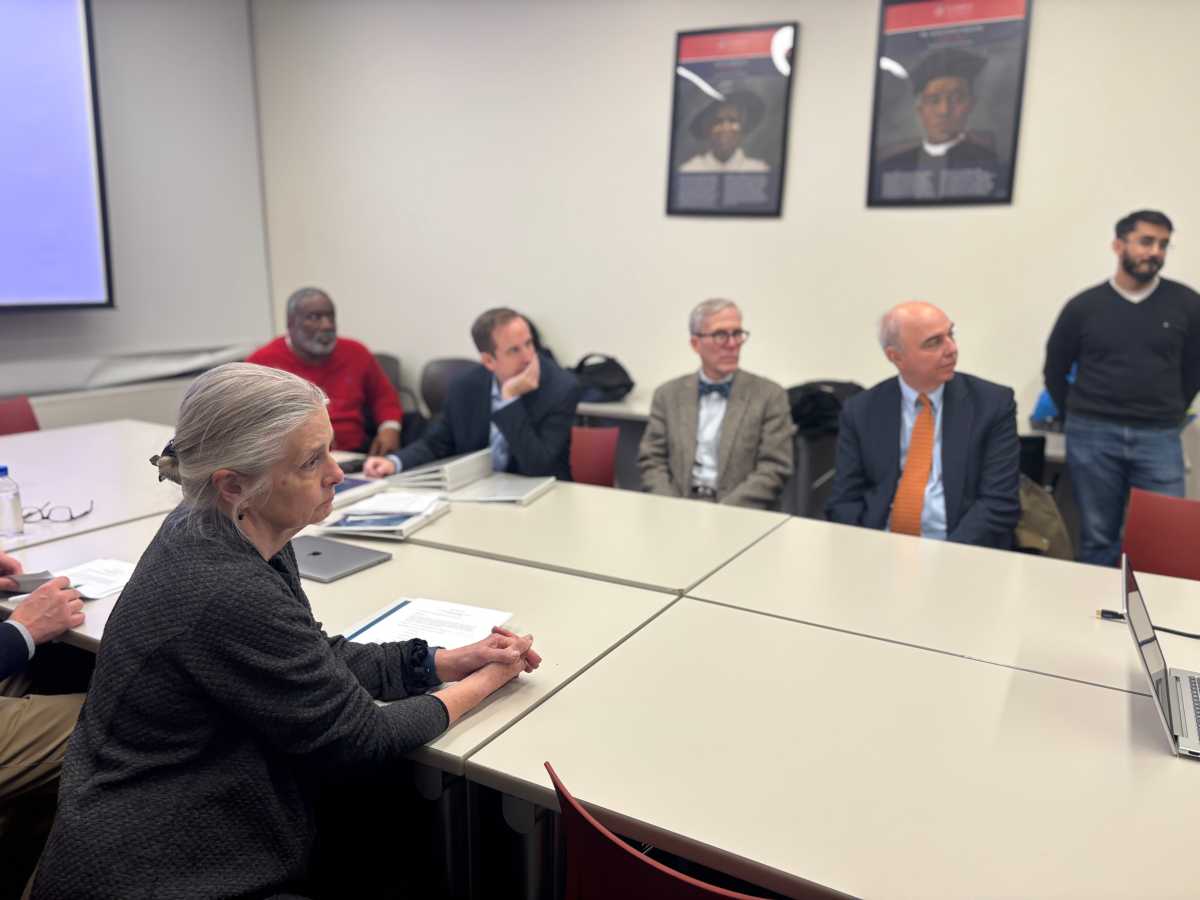
The debate over Steve Cohen
Hu and other organizers argued that the gaming commission was breaking the law, claiming that billionaire Steve Cohen, owner of the Mets and leader of the Metropolitan Park proposal, was not of good moral character — a requirement for the gaming commission to grant a casino license. Cohen’s hedge fund SAC Capital Advisors pleaded guilty to insider trading and security fraud in 2013, paying a $1.8 billion fine.
Cohen himself was never charged with any wrongdoing, and the case didn’t prevent Major League Baseball from approving his purchase of the Mets in 2020.
Karl Rickett, a spokesperson for the Metropolitan Park, responded to concerns raised by protesters in an email to QNS on Nov. 19. He said Cohen’s ownership of the Mets has been celebrated by fans and the local community. He also included several statements by Queens community organizers — including Peter Tu of Community Board 7; Shimi Pelman, Queens district leader 27-B; and Darren Meenan, founder of Mets fan group The 7 Line Army — advocating for Cohen’s character.
“Since last winter, I have met with Steve Cohen and his team several times,” Tu said in a 2023 op-ed. “I have also attended one of the visioning sessions in Citi Field. They have been listening to my concerns and suggestions very carefully. And they have been keeping the communication open and giving me regular updates. I have never seen this level of community engagement from any proposals before”
The economic impact
Rickett also listed the short-term and long-term economic benefits forecasted by the company once the project breaks ground. According to his email, 23,000 “good-paying” union jobs would be created, with over 6,000 of these positions being permanent after construction is complete. He stated that the team would hire workers on a Queens-first basis and anticipates average earnings would be over $140,000 per year for permanent full-time team members, which is well above the average median wage in the borough, which is $62,000.
Thomas Grech, president of the Queens Chamber of Commerce, said after seeing those numbers, he believes this investment will only bring positive outcomes for the community. Businesses that are part of the chamber have shown significant support for the project, as well, Grech added.
“This is generational wealth building, as far as jobs go,” Grech said. “Most of them are more than just jobs. They’re careers. … Right now, it’s an unused, 50-acre piece of blacktop and asphalt that hasn’t been used well in the last 75 years before the first World’s Fair. So now, there’s a real chance here to help the community at large.”
According to supporters, the Metropolitan team said the casino was the economic driver of the project and the rest of the proposal — such as the park, updated Willets Park subway station and food hall — could not exist without it.
However, protesters argued that the casino would not generate the economic benefits purported by the Metropolitan Park team, which forecasted the project would bring in over $33 billion in tax revenue over the 30-year period after its completion.
“All they’re going to do is suck up all of the revenue from the surrounding community and reshuffle it. That is not economic development,” Hu said, later reiterating that he and other organizers are against all casinos.
According to an August 2023 study published by Nature.com, high casino proximity is associated with higher poverty levels. Picketers said they felt the casino was predatory and could take advantage of Asian-American families in Flushing — 70 percent of which identify as Asian — who are more vulnerable to problem gambling according to a 2009 Columbia University study.
A Nov. 12 New York Times article also found that despite projections by casino owners, many casinos in large urban areas like New York have come up short. It also states that casinos create small economic pockets that rely on local customer bases and can result in job losses elsewhere in the community that cancel out gains in jobs and revenue through those casinos.
Handling problem gambling
In terms of problem gambling, supporters of the casino said there would be resources provided through the project to support those suffering from addiction. Rickett noted that among the $1 billion in community benefits that would be generated through Metropolitan Park would include a Community Impact Fund and specific funding for responsible gaming, addiction and mental health services. “We take our responsibility to be a good neighbor and a good partner seriously,” Rickett wrote.
Costa Constantinides, a Queens resident whose father suffered from gambling addiction, said he is in support of the casino because regardless of its presence, those addicted to gambling would find a way to do it anyway.
“I don’t think accessibility is the problem,” Constantinides said, noting that gambling is even more accessible online. “This casino is not doing anything different than anything that’s already out there.”
Grech added that the Metropolitan Park team has repeatedly stated in meetings that it does not want people with gambling problems in the casino and instead envisions it as an entertainment venue.
Rickett pointed to a 2024 study by University of Massachusetts Amherst that found proximity to casinos does not change problem gambling behaviors or result in more gambling addiction. However, the same study found that most revenue generated by casinos were from problem gamblers.
“There needs to be a reduction of the casino industry’s financial reliance on at-risk and problem gamblers as the 90% of revenue from this 9.9% of the population is much too high,” the study concluded. “It serves to increase the chronicity of problem gambling and the likelihood of ‘at-risk’ gamblers transitioning to problem gamblers.”

The role of elected officials
The same protesters who attended the Monday night picket hosted a massive anti-casino rally the previous day at the Queens Public Library, which drew nearly a thousand people to protest the development, as well as Gov. Kathy Hochul and State Sen. John Liu.
Protesters expressed anger and disappointment that Liu sponsored the parkland alienation bill (S7121A/A6781), which allowed Cohen to bring forward the Metropolitan Park proposal.
According to Liu, he supported the project proposal but had not articulated his position on the casino itself. He said the merits of the proposal are in the hands of the gaming commission, which he has no part in.
“I appreciate that these people are against the proposal,” Liu said. “Problem is, there are many people and entities that are very much in favor of seeing this proposal go forward.”
The state senate voted in favor of the park alienation bill 54-5, the Community Advisory Committee voted unanimously in favor of it 6-0, and all community boards in the area support the project, as well.
“The approvals from six out of six Community Boards, the City Council, State Legislature, and the entire Community Advisory Committee underscore the deep and broad community support for Metropolitan Park,” Rickett added.
Rickett also linked two polls by Schoen Cooperman Research, released in May 2023 and March 2024, which found widespread support for Metropolitan Park, including the casino, among elected officials and surrounding communities.
Liu said he hates gambling and believes it’s bad for people to engage in. “If I had it my way, gambling would simply be banned in New York State,” he said.
At this point, he continued, there is nothing that he can do to stop the process since the state legislature already approved the bill that allowed for the proposal in May, which was also signed by Hochul in June. Even without the casino, he argued, the community has access to plenty of other casinos nearby.
Liu also said he would not apologize for supporting parts of the project that include the new Willets Point subway station and 25-acre park. The casino, he reiterated, is the part of the project that generates revenue and resources to allow for the rest of the plan to come to fruition.
“I try to discourage from gambling,” Liu said. “Unfortunately, there are some people who are going to do things that, in my opinion, are bad for them. But they’re still going to do them anyway.”
However, protesters were not happy with Liu’s response.

“We are not buying [Liu’s] story,” Jack Hu said. “The idea that he can’t do anything is laughable, because we all know public pressure is one of the most important things in a democracy. That’s why we’re taking to the street with 800-1,000 people, because our leaders will listen to us when there are enough people upset about a certain issue. [Liu] knows that, he’s a senator.”
“We think that [Liu] does not deserve to be our elected representative anymore,” Ahn added. “We gave him a chance, and he didn’t listen.”
Ahn said giving away public land for a casino is not a “neutral” decision, and she believes Liu and other elected officials were “taking money” in exchange for support of the casino. The only way Liu and Hochul could make things right, she continued, was by reversing their decision to give up the parkland for private use and build affordable housing instead.
“If our representatives actually fought for the interest of the working people, they would know our greatest need is affordable housing,” Ahn said.
“I’m hoping to see a bit of moral courage from [elected officials] to speak up for what’s right and join us in opposition of the casino,” Khan added. “[Liu] should be doing better for the community.”

